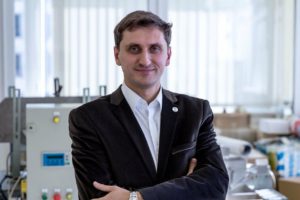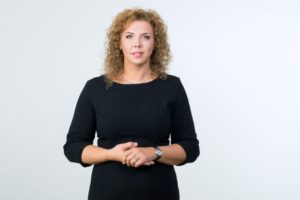Smart waste collection systems, advanced street lighting, mobile applications informing on the traffic are just a few examples of technologies for a smart city. Every year, consumption and pollution rates go up people living in urban areas are experiencing parking and traffic problems, therefore the demand for technology and science-based solutions in cities increasing. Kaunas City Municipality aiming to improve the life and well-being of citizens involved KTU students into solving real challenges the city faces.
While solving the challenges, it is necessary to focus not only on the result but also on the impact of the solution to the future, and in this aspect, students are crucial to involve. The challenge related to the efficient resource management in Kaunas was presented by the Member of Kaunas City Municipality Council, Dr Visvaldas Varžinskas; the challenge was solved by the students participating in the first ECIU University Challenge organised by Kaunas University of Technology (KTU), which, together with 11 partners in Europe, is a part of ECIU University.

“The city is a living ecosystem that connects many ongoing processes to ensure life quality. Urban population, business, industry, transport and other processes require many materials and energy resources. Today, when European cities face challenges caused by climate change, pollution and traffic, it is necessary to find solutions based on innovation and artificial intelligence”, says Dr Varžinskas, the Head of KTU Centre for Packaging Innovations and Research.
The Kaunas city challenges were introduced to the students of Computer Intelligence and Decision Making, a challenge-based module created by KTU. Students had to solve efficient resource management, air pollution, optimal routing of waste collection, parking, and road pothole challenges. The first group of students has already completed the module, offering five technology-based solutions.
“Kaunas has strong universities and scientists working and living in the city who are very familiar with everyday problems. Therefore, the emerging partnership between the city and science, the ideas and solutions created by students and scientists on how to overcome the challenges and manage the city’s recourses, are very gratifying”, Dr Varžinskas says.
Video material has a great potential to solve on-road problems
Constantly increasing number of cars in the city causes lack of free parking spaces. One solution proposed by the students which would help people save time finding a parking place – space identification system based on video processing technological solutions.
Video cameras can detect parking spaces while prioritising free ones and thus reduce the time spent looking, for example, in the Kaunas city centre and the Old Town. Such a system is simple to implement in places that already have cameras – it only needs to access live streaming and mobile app installation on a smartphone.

“I see the benefits of such a system because I believe everyone has encountered a problem of looking for a parking space, especially in Kaunas centre. This problem also often occurs near larger shopping centres or during events in the city”, says Agnė Paulauskaitė-Tarasevičienė, associate professor at KTU Department of Applied Informatics and the coordinator of ECIU challenge-based module.
Another challenge for the drivers is potholes. They are caused by changes in the temperature, the quality of the road surface, and other problems. Road disturbances cause traffic congestion, they might damage the tires and wheels. Insurance experts say that the expenses after hitting a pothole can vary from 50 to 5 thousand euros.
A potential solution is an automatic pothole identification system using visual material. This type of system could be installed in a mobile app or any other system with a video recording function.
“I think that a mobile app would be really useful by allowing the drivers themselves to mark a pothole. The road inspection could react much faster to the most problematic road sections, which were marked the most often. Also, this would help monitoring the general road surface condition”, says Paulauskaitė-Tarasevičienė.
Technology might be the key element for a better environment
Many urban cities, and Kaunas suffer from particle pollution. According to the data from Eurostat, cars are the most common form of transportation in the European Union. In Lithuania, 91 per cent of the population choose travelling by car. Also, mortality from on-road vehicle generated air pollution in Lithuania is one of the highest among Organisation for Economic Co-operation and Development (OECD) member countries.
Air quality monitoring stations can determine the pollution level in a city, but it is important to choose the right location. To solve this problem, students propose an air pollution identification system to determine how many and where air pollution measuring stations should be built.
While waste disposal is important for efficient resource management, re-use of resource also plays a crucial role. Therefore, improving the operation of municipal waste collection systems and waste removal companies’ schedule could be implemented. Smart prognostic waste disposal bins could determine the amount of waste in a container. Such technological solution would allow schedule and route optimisation of waste disposal companies.
According to KTU associate professor, Agnė Paulauskaitė-Tarasevičienė, for smart disposal bins, the city would need specific equipment, such as sensors, activators and data warehouses.
Every year, the EU generates 2.5 billion tons of municipal waste. However, education and citizen involvement are the two key elements for effective waste management and prosperous development of cities.
During the challenge-based study course, KTU students also tackled the problem of civic education by offering to implement a mobile app which would encourage the population not to ignore rubbish around, to collect and to dispose of it. The purpose of the app would be encouraging people not to be indifferent to pollution.
Challenge-based learning – for more effective cities
In the focus of challenge-based learning model are real life challenges, and the role of external partners here is crucial. They bring a big idea into the learning process, which becomes the starting point for further generating the challenge and finding solutions.

“Challenge-based learning can be compared to intensive two-way traffic. In this process, not only students benefit from finding answers and solutions, but also the organisations involved, which have a unique opportunity to observe and take part in the process. However, from the process, the society benefits also, as all big ideas are based on the 11th UN sustainable development goal – Sustainable cities and communities”, says Dr Asta Daunorienė, the Head of at KTU EDU_Lab Teaching and Learning Competence Centre.
During challenge-based learning process, it is important to provide students with contextual, area-specific knowledge to address the challenge; to solve it, a symbiosis of creative thinking and analytical knowledge is necessary. Besides, the external partners need to be creative, open, and not to focus on one most expected outcome.
“The process of solving the challenges demonstrated by students can become a good start for other initiatives that would help ensure a sustainable development of cities and communities”, adds Asta Daunorienė.